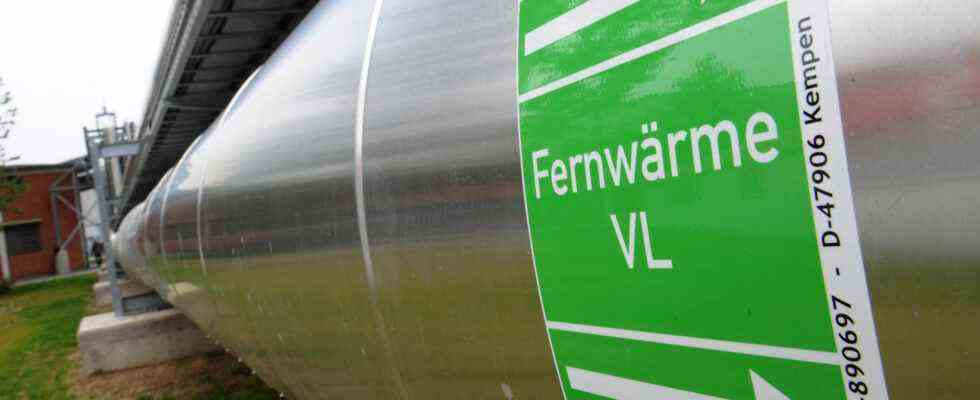Status: 02/02/2022 08:10 a.m
New rules for district heating significantly strengthen consumer rights. This saves up to a quarter of the heating costs. What homeowners and renters should consider.
It was a lightning move by the former Federal Minister of Economics, Peter Altmaier: in his last days in office, the CDU politician had two paragraphs of the General Contract Conditions for District Heating AVB amended – largely unnoticed by the lobby and the public. The regulations, which many experts believe are outdated, now contain provisions that put district heating customers in a much better position. Owners and tenants can now significantly reduce ancillary heating costs.
The new paragraph 3 in the regulation on general conditions for the supply of district heating AVB makes it possible. There, customers are given the opportunity to have the so-called heat output reduced by half in the current contract without giving reasons.
What does that mean? The heat output refers to the maximum heat provided by the supplier. The problem: It is often much too high and is not needed at all. Customers still pay for it. The heat output is calculated with the fixed basic price, which often accounts for around half of the total bill in addition to the consumption costs. According to research by ARD consumer magazine Plus minus The bottom line is that customers can save up to 25 percent on heating costs with the new rule.
Outdated Rules
So far, providers in regional monopolies have been able to push through extreme price increases. Just one current example: the municipality of Enkenbach-Alsenborn near Kaiserslautern. For residents of a new development district, the basic price quadrupled in 2021. The entire settlement is subject to compulsory connection and use. The residents therefore have to heat with district heating and cannot switch.
The single-family houses all have a district heating connection with a heat output of 20 kilowatts, no matter how large they are. According to an overview by the VdZ Forum for Energy Efficiency, an average house with 150 square meters of recent construction would need around 7.5 kilowatts, i.e. far less than half. On request from Plus minus the mayor now assures that from now on “the actual output will be used for the basic price calculation, not as stated in the contract, generally 20 kilowatts”.
Heat output often excessive
Werner Dorss, lecturer and lawyer for energy law, has been observing for years that the heat output of many building connections is oversized and can be reduced without any problems. In practice, in agreement with some municipal utilities, he has actually already halved the heat output without ever suffering from an undersupply. The Association of Energy Consumers also complains about the problem of excessive connection values. In some cases, only eight instead of 30 kilowatts of heat output are required.
Thomas Engelke, Head of Energy and Buildings at the Federal Association of Consumer Organizations, recommends checking the required output before reducing to rule out the risk of undersupply. Affected consumers should first go to energy advice and seek advice. Then they could inform the district heating operator that they want to reduce their connected load, and they could do so by up to 50 percent.
Tenants are also affected
Not only owners, but also tenants can defend themselves against excessive district heating costs. Klaus Saage lives in a 60 square meter apartment in a large rental block with 1800 units in Berlin. He complains about the amount of his district heating service charge bill. When looking through his documents, it is noticeable that the fixed basic price makes up 63 percent of the total bill compared to the consumption costs. So he cannot influence that even with economical heating.
But he can ask his landlord to reduce the basic costs for the heat output. He can refer to Section 556 of the German Civil Code, the requirement for cost-effectiveness. This means that landlords are obliged to act economically and to consider the interests of tenants. If the costs are too high, lawyer Dorss advises those affected to approach landlords. If an amicable solution is not possible, you can either reduce the additional costs or pay them with reservations – with the option of reclaiming the excess later.
Different reactions from providers
Plus minus there are various contracts and internet information from district heating suppliers. Some, like Frankfurt’s Mainova, for example, are open about it, even publishing guidelines on how to check heat output and exploit potential savings. Stadtwerke Karlsruhe have already adapted their contract clauses to the new rules.
Others are bricking. A supplier tries to circumvent the rules with new contracts with the text: “The customer waives further legal adjustment claims”. The industry association, the working group for district heating, considers the new legal requirements to be controversial “because of the considerable interventions involved”.
Will the Economics Ministry change the rules again?
The previous innovation in the AVB for district heating was written quickly in order to avoid an EU infringement procedure in the course of the implementation of the energy efficiency directive. However, the Ministry of Economic Affairs is currently revising the AVB district heating fundamentally. A draft should be available in February, which should be adopted by Easter.
The Federal Association of Consumers (VZBV) fears that this new regulation to reduce the connected load could be changed again. The VZBV does not want that under any circumstances – it is correct, as it is now regulated. Customers should therefore seize the current opportunity to reduce the heat output.
Plusminus reports on this topic on February 2, 2022 at 9.45 p.m. in the first.

